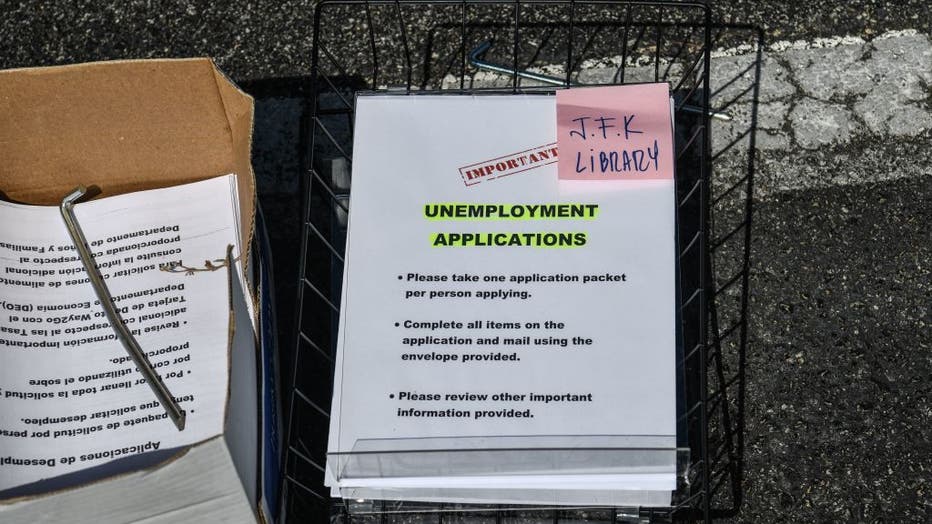American unemployment claims fall to 751,000; coronavirus resurges
WASHINGTON (AP) - The number of Americans seeking unemployment benefits fell last week to 751,000, the lowest since March, but it's still historically high and indicates the viral pandemic is forcing many employers to cut jobs.
Applications for unemployment aid fell 40,000 from the previous week, the Labor Department said Thursday. They fell in 30 states, including big drops in California, Florida and Texas. Claims rose in Arizona, Illinois, and Michican.
Rising confirmed virus cases in nearly every state, along with a cutoff in federal aid, are threatening to weaken the economy in the coming months. As temperatures fall, restaurants and bars will likely serve fewer customers outdoors. And many consumers may increasingly stay home to avoid infection. Those trends could force employers to slash more jobs during the winter.
The seven-day rolling average for confirmed new cases in the U.S. soared over the past two weeks from 51,161 to 71,832, according to Johns Hopkins University data.
RELATED: US economy grew at 33% rate in 3rd quarter but recovery is incomplete
The government said Thursday that the economy expanded at a record 33% annual rate in the July-September quarter. That's a sharp rebound after an epic collapse in the spring, when the economy shrank at a 31.4% annual rate. Yet the increase recovers only about two-thirds of what was lost to the pandemic. And growth is believed to be slowing sharply in the final three months of the year to a roughly 3% annual rate.
With Congress having failed to agree on any further stimulus this year, millions of unemployed Americans who will lose all their jobless benefits in the coming weeks and months will likely pull back further on spending. Without another round of loans from the government, many small companies will also go out of business.
Thursday’s report from the Labor Department said the number of people who are continuing to receive unemployment benefits fell more than 700,000 to 7.76 million. The decline shows that some of the unemployed are being recalled to their old jobs or are finding new ones. But it also indicates that many jobless Americans have used up their state unemployment aid — which typically expires after six months — and have transitioned to a federal extended benefits program that lasts an additional 13 weeks.

Unemployment forms are seen kept at a drive thru collection point outside John F. Kennedy Library in Hialeah, Florida, on April 8, 2020. (Photo by CHANDAN KHANNA / AFP) (Photo by CHANDAN KHANNA/AFP via Getty Images)
The still-elevated number of jobless claims underscores that a full recovery from the pandemic recession remains far off. Job growth has slowed for three straight months, leaving the economy still 10.7 million jobs short of its pre-pandemic level. The unemployment rate remains high at 7.9%.
Layoffs have continued at some large companies. Boeing said Wednesday that it will now cut 30,000 jobs by the end of next year, almost one-fifth of its entire workforce, up from an earlier announcement that it would shed 19,000.
Home and auto sales have emerged as bright spots in the economy and have helped strengthen U.S. manufacturing. But the pandemic recession, unlike previous downturns, has done much more harm to in-person services and cost the jobs of millions of workers at restaurants, bars, gyms, and theaters.
Those businesses have suffered from government shutdown orders, some of which might now be revived as the virus resurges. Even without shutdowns, the reluctance of many people to travel, shop or dine out for fear of contracting the virus has compounded the difficulties for face-to-face service industries.
In a sign of caution, Americans boosted their savings over the summer, banking a big chunk of the $1,200 checks that had gone to most individuals and a now-expired $600-a-week federal jobless benefit. Both were contained in a $2 trillion stimulus package that Congress approved in the spring.
Some research suggests that by September, unemployed Americans had spent about two-thirds of what they had saved. If so, the jobless will likely cut their spending in the coming months and weaken growth.
Americans are already showing concern about the economy. Consumer confidence slipped in October after having risen sharply in September. The outlook for the economy over the next six months fell particularly hard, according to the Conference Board, a business research group.
With roughly 20 million Americans unemployed, the pandemic recession is still causing hardship for many families. One-quarter of all adults say their family’s financial condition worsened in September compared with February, before the pandemic, according to a survey by the Urban Institute. One in seven say that they or a spouse or partner has lost a job during the downturn.

